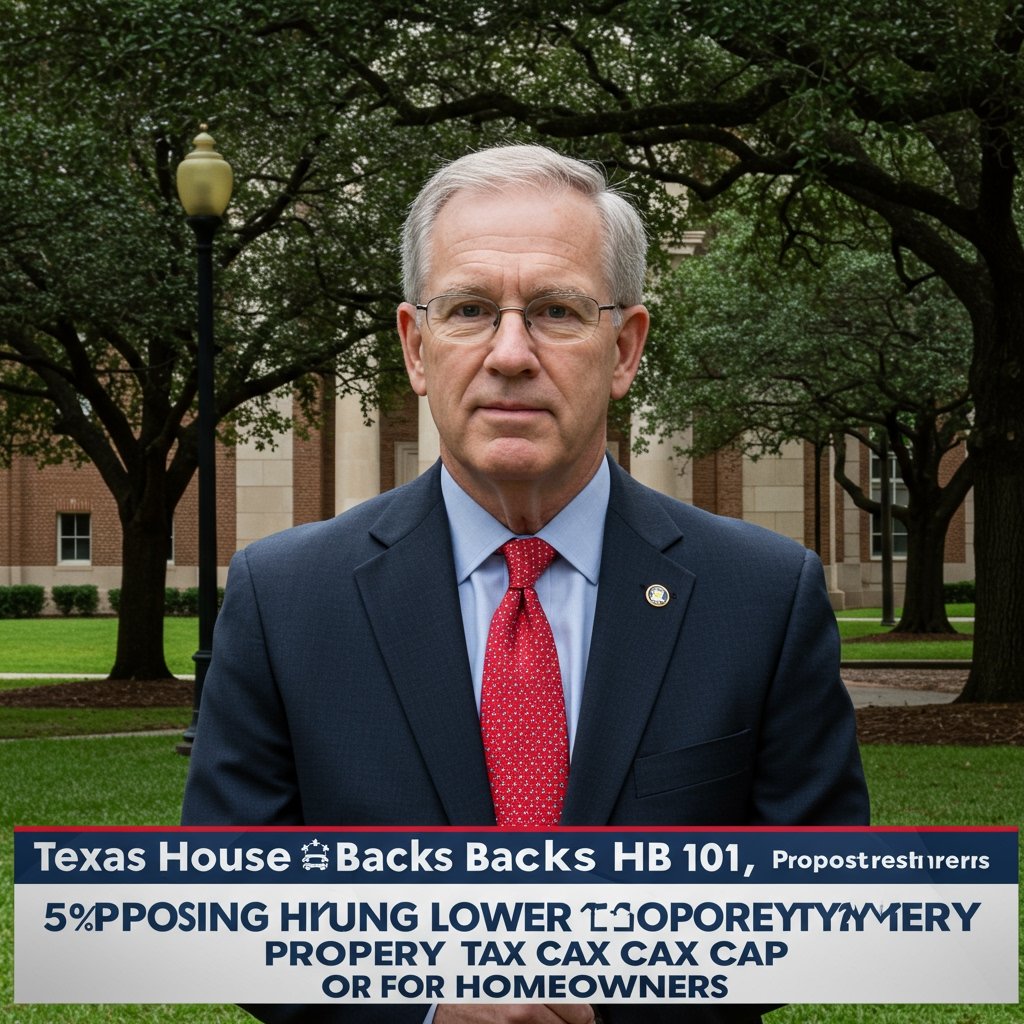Texas House Advances Key Property Tax Cap Bill
A significant legislative step toward reshaping Texas’s complex property tax landscape was taken on Thursday, as the Texas House of Representatives passed HB 101. This pivotal piece of legislation, championed by Representative Jane Smith (R-District 45), aims to dramatically alter the annual limit on how much the taxable value of residential homesteads can increase, proposing a statewide cap of 5% – a substantial reduction from the current 10% limit.
The measure’s passage followed extensive debate on the House floor, reflecting the high stakes and diverse opinions surrounding property tax relief in a state experiencing rapid growth and escalating property values. When the votes were tallied, the bill advanced with a count of 85 in favor and 60 opposed, sending it to the upper chamber for further consideration during the ongoing legislative session.
Understanding the Current System and Proposed Change
Texas relies heavily on local property taxes to fund essential services, most notably public education and municipal operations. Property taxes are calculated based on the appraised value of land and structures, determined annually by local appraisal districts. For homeowners who qualify their property as their primary residence (a homestead), current law provides a measure of protection: the taxable value of their home cannot increase by more than 10% per year, regardless of how much the market value may have risen. This “homestead cap” or “circuit breaker” is designed to prevent sudden, drastic increases in tax bills.
HB 101 zeroes in on this specific mechanism. Instead of abolishing property taxes or drastically reducing rates across the board (though other bills may address those), HB 101 focuses on slowing the growth of the tax base for homestead properties. By lowering the annual cap on taxable value increases from 10% to 5%, the bill seeks to offer a greater degree of predictability and constraint on property tax bills for qualifying homeowners, particularly in areas experiencing rapid appreciation in property values.
Representative Jane Smith, the bill’s author, and other proponents argue that the existing 10% cap is insufficient in today’s market conditions. They contend that while 10% might have been adequate protection in periods of moderate growth, the double-digit increases in property values seen in many parts of Texas in recent years mean that homeowners are still facing significant annual tax hikes, even with the current cap in place. A 5% cap, they posit, would provide more meaningful relief, making homeownership more sustainable and protecting long-term residents, especially seniors and those on fixed incomes, from being priced out of their homes due to rising tax burdens.
Debate and Division on the House Floor
The House session that saw the passage of HB 101 was marked by robust discussion and sharp divisions. Supporters reiterated the narrative of overburdened taxpayers and the urgent need for tangible relief. They highlighted personal stories of constituents struggling to keep up with escalating tax bills and framed HB 101 as a direct response to this crisis. They emphasized that while it doesn’t slash tax rates, it provides a critical brake on the assessment growth that drives bills higher.
Opponents, however, voiced serious concerns about the potential long-term fiscal implications of the bill, particularly for local governments and public school districts that depend on property tax revenue. They argued that limiting the growth of the tax base to 5% annually could constrain the ability of cities, counties, and school districts to keep pace with rising operational costs, inflation, and the demands of serving growing populations. Critics suggested that this cap could force local entities to either raise tax rates on non-homestead properties (like businesses) to compensate, cut services, or seek alternative funding sources, potentially shifting the tax burden or impacting the quality of local services and education.
The extensive debate saw members on both sides presenting data, constituent anecdotes, and legal interpretations of the bill’s potential effects. Amendments were proposed and debated, though the core mechanism of the 5% cap ultimately remained intact through the House vote.
Path Forward: The Texas Senate
With the House’s approval, HB 101 now faces its next major hurdle: the Texas Senate. The Senate has historically approached property tax reform with its own priorities and proposed solutions. While there is broad agreement among lawmakers on the need for property tax relief, the methods for achieving it often differ between the two chambers and even within parties.
The bill will be referred to a relevant committee in the Senate, where it will undergo further scrutiny, potentially hear testimony from stakeholders (including taxpayer advocates, local government officials, and education groups), and may be subject to amendments. Its fate will depend on gaining committee approval and then securing sufficient votes on the Senate floor. It’s common for the House and Senate to pass different versions of property tax reform bills, necessitating negotiation in a conference committee to arrive at a final version palatable to both chambers before it can be sent to the Governor’s desk.
Sources close to the legislative process indicate that property tax reform remains a top priority for state leadership this session, suggesting that HB 101, or a bill with similar objectives, has a strong likelihood of continuing through the process. However, the specific details – including the precise cap percentage and implementation nuances – could still change as the bill moves through the Senate and potential conference committee negotiations.
Conclusion
The passage of HB 101 by the Texas House marks a significant step in the ongoing legislative push for property tax relief. By proposing a substantial reduction in the annual growth cap for residential homestead taxable values, the bill directly addresses concerns about escalating tax burdens on homeowners. While proponents hail it as essential relief, critics raise valid questions about its fiscal impact on the local entities funded by these taxes. As HB 101 now proceeds to the Texas Senate, its journey underscores the complexity and political intensity surrounding efforts to balance taxpayer relief with the financial needs of local governments and school districts across the state.






